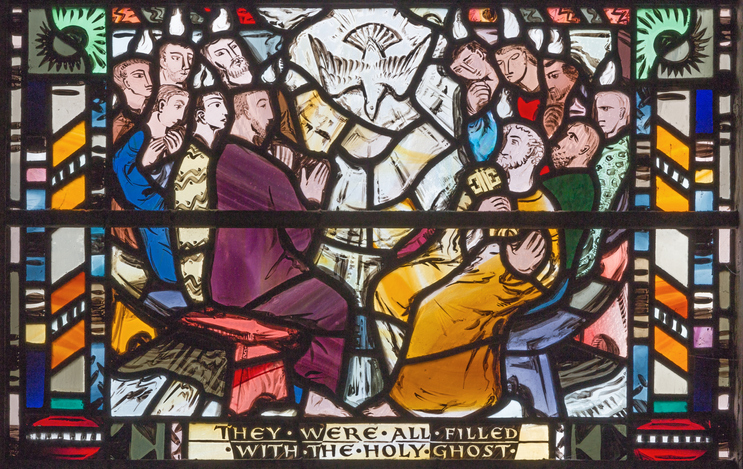May 1, Acts 9: 1-6 (7-20)
Acts chapter 9 is a crucial turning point for the young Christian church that transformed not only a man named Saul, but also the entire Christian church. The transformation that occurred that day in Damascus still challenges the church to be transformed today. The events of Acts 9 tilted the trajectory of the church’s ministry, widening and reorienting its purview to include the Gentiles. The conversion of Saul was the beginning of God’s provision to send workers into the ripe, Gentile harvest field. In that moment, God miraculously stepped into history and dramatically changed one person’s life, which in turn changed the entire church. In doing so, God displayed his deep love for the world and his desire to redeem it.
On that day, the life of a man named Saul of Tarsus was unexpectedly and miraculously transformed. Of course, Acts chapter 9 is not the first time Saul appeared in the story of Acts. He was previously seen at the end of chapter 7 at the stoning of the first Christian martyr. We find him “breathing out murderous threats against the Lord’s disciples” (9:1) and taking a trip to harass and stamp out a rebellious sect of people known as Christians.
We see in the following verses the understandable fear and hesitation of the church to engage with Saul (vrs. 13-14, 21, & 26). This is completely understandable given what he had already done. But thanks be to God, we also see them heedfully listening to the voice of the Spirit above their fear, carefully responding in obedience by welcoming the infamous Saul of Tarsus into their homes and beginning to disciple him in the faith. What an awesome display of the transforming power of the resurrected Jesus.
How can we today, in our setting, live out the mandate of Jesus to “Love our enemies and pray for those who persecute us?” How can we lead and challenge our people to allow their worldview to be shaped by the Spirit and Scripture over the 24 hour media outlets which deepen fear? How can we put our lives on the same path as the resurrected Jesus? How can we lead our congregations onto that same transforming path?
May 8, Acts 9:36-43
Luke’s accounts of the Acts of the apostles tells the story of the early church. While the book has been called the acts of the apostles, it would not be inaccurate to call it the Acts of God through the apostles for the book records the incredible things that God does in, for, and through the church.
Luke researched his gospel to write an orderly account. We can rightly assume that this letter has been meticulously crafted. As such there are probably dozens if not hundreds of stories which could have been included in the book, but they were excluded making the question, “Why was this account included” a valid question for any pericope. When we come to the story of Tabitha, this question helps provide even more insight. The obvious answer to “Why was this included” is that Peter was the one through whom the Holy Spirit resurrected Tabitha. Healings are amazing, but they pale in comparison to a resurrection! Of course Luke would include a resurrection.
So why was the relatively unremarkable Dorcas resurrected? We can fall into the trap of treating people as if their value is only found in what we can get out of them. Dorcas stands as a corrective against that. She is a normal person doing normal things, serving God with what she has. We ought to learn that God seeks to bring us new life in the midst of our mundane lives. The seemingly banal parts of our lives could be exactly what God desires from us. Living a quiet life of faith is not a waste of life, it could actually be a testimony to the resurrection.
May 15, Acts 11:1-18
Us. Them. We use these pronouns to describe (rather ambiguously) the people or group with whom we identify … and others from whom we distinguish ourselves. Sometimes these distinctions are based on perceptions and biases about others that can create separation and cause harm despite our good intentions. Human history is filled with countless examples of conflict between groups and parties that acted on their distrust of “the other” (i.e., of “them”), often through war or various forms of systemic prejudice and oppression.
When we encounter this week’s reading, the initial response to Peter upon his return to Jerusalem after his time in Caesarea with Cornelius the centurion should raise many questions. What might the questioning by the centurion reveal about “us” and “them” in our contemporary contexts? Do we fail to recognise God at work because our generalisations and labels define and all-too-often specify who is and isn’t “us” or “them,” Christian, orthodox, evangelical, Spirit-filled, liberal or conservative (whatever these mean), or whatever else that we use that may end up blocking our view of what God may be doing?
May 29, Acts 16:16-34
As we draw near to Pentecost—our first reading, Acts 16:16-34, leads us to reflect upon the dynamics of the liberating salvation that has come near in Jesus as we find Paul and Silas bearing witness to it in their words, bodies, silence, and celebration in Philippi. Lydia, who after being baptised welcomes Paul and Silas into her home where they stay during their visit.
Those who receive salvation and step into it, immediately assume a posture of hospitality. What does this tell us about what the working out of salvation looks like for the Christian community? Is extending hospitality to others our first response to the grace we’ve received from God? Salvation has come, let’s extend hospitality to others, and let’s celebrate together in this eucharistic feast that gives us a glimpse of that heavenly banquet we’ll celebrate when the fullness of salvation comes.














